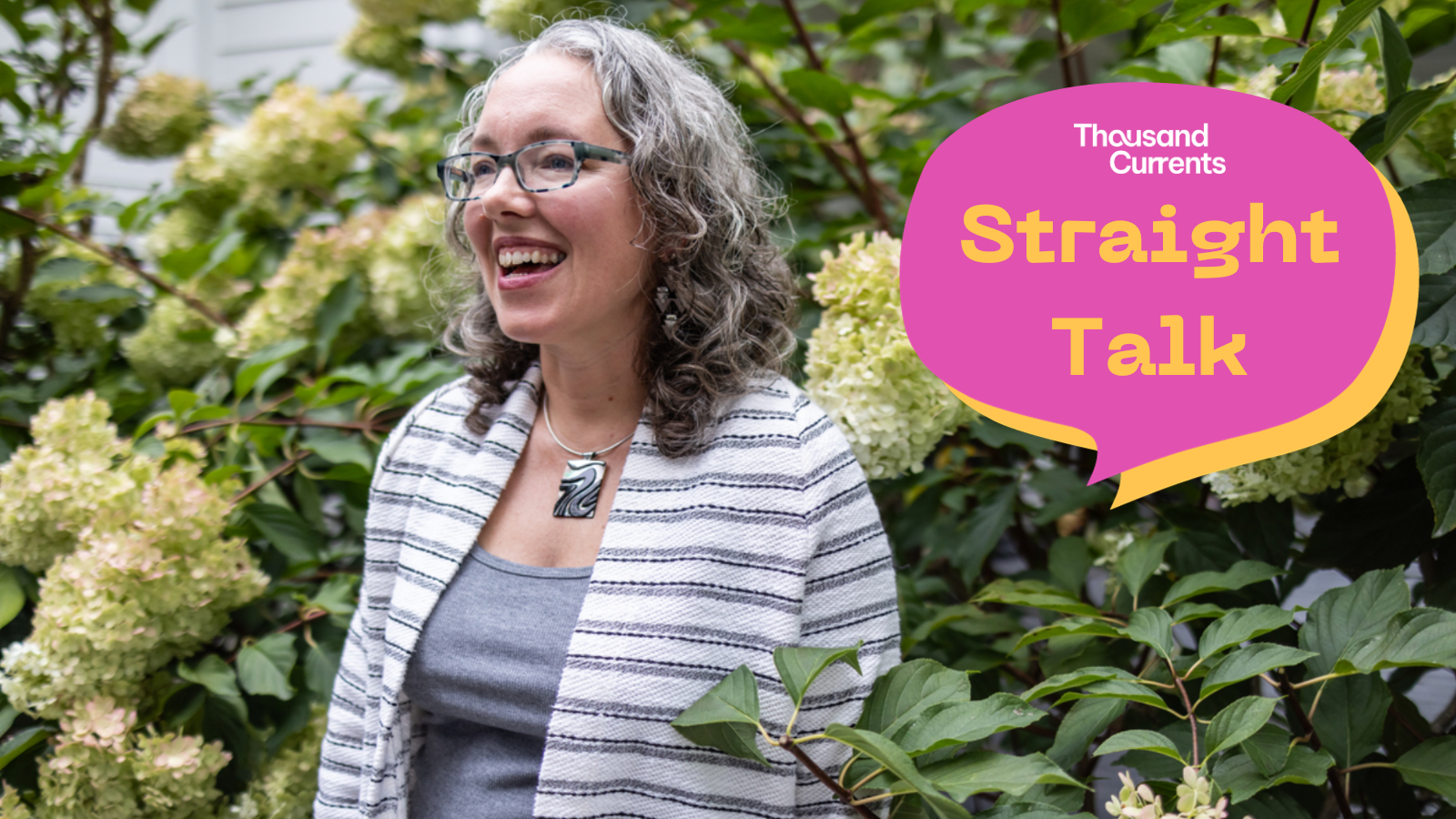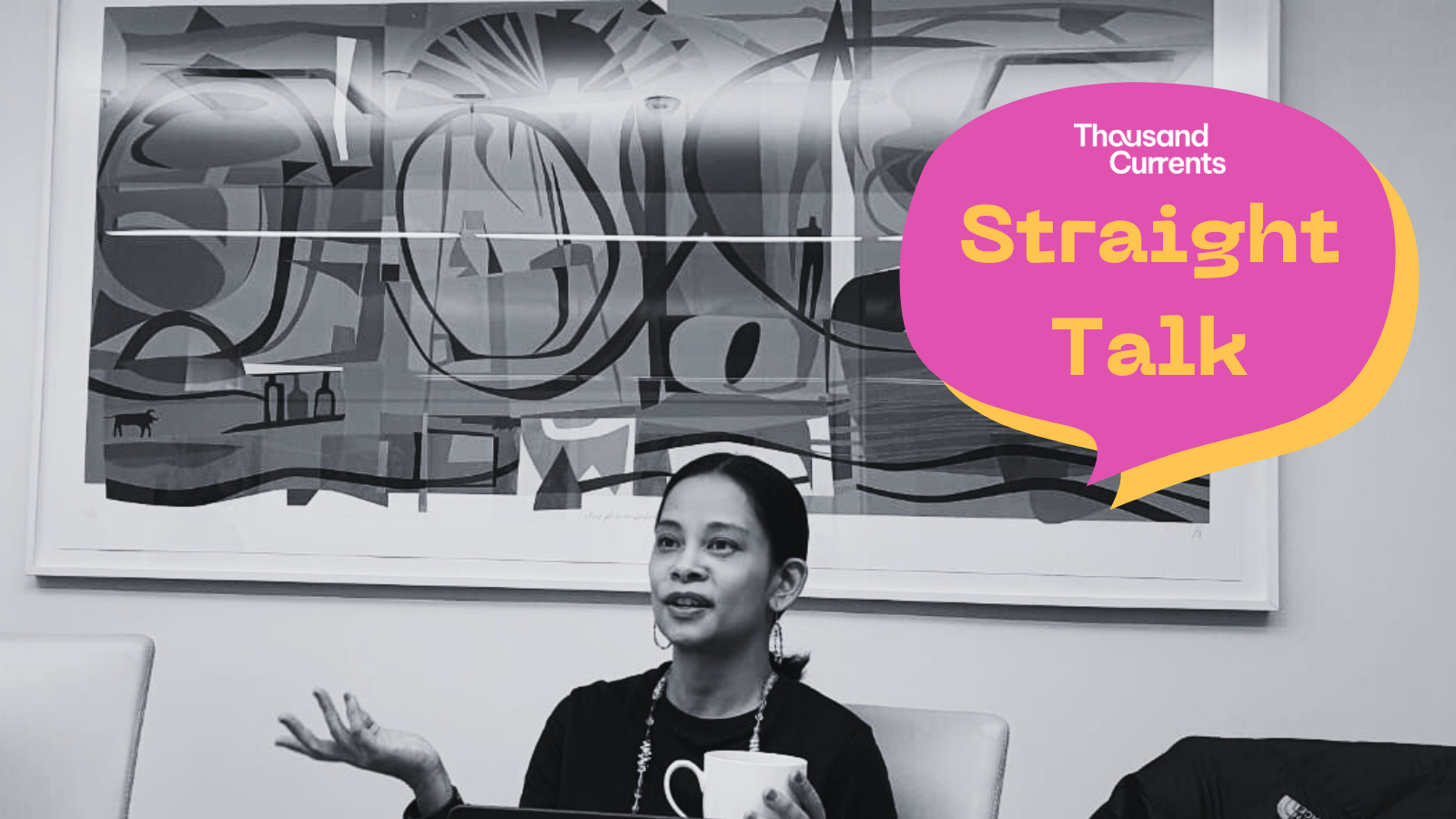Straight Talk: “We are accountable to our partners”

We’re back with Straight Talk, our interview series with members of the senior management team at Thousand Currents. This series explores the current state of philanthropy, reflects on leadership practices, and feeds our strategic goal to shift narratives, in order to advocate for more resources for grassroots organizing.
In this piece, we connect with Katherine Zavala (Thousand Currents’ former Director of Programs.) After building her leadership in the Global Programs and Learning Initiatives teams, Katherine is now joining the Global Operations team, where she will strengthen internal alignment and systems in an exciting moment of organizational growth. In this interview, Katherine talks about what it means to support internal change, what philanthropy still needs to learn, and the valuable lessons she has learned from movements. Read on.

How do you understand and assess organizational effectiveness?
We’re in a moment of immense growth, abundant possibilities, and lasting change. As an entirely remote organization with an increasingly global staff, how do we continue to be rigorous and effective in our internal practices, within and across teams? How do we work together with systems, agreements, and accountability practices to fulfill the core purpose of the organization, which is to mobilize more resources for our movement partners? How do we do this work in the most values-based, accountable way to really serve our partners by giving them more resources? Where are we now, and where do we need to be in order to be effective? We need to be very open about all of this, because clarity, work culture, and mutual agreement are so critical. We need to develop, adapt, reconfigure, and strengthen our systems. So, for me, organizational effectiveness is ensuring everyone has all the information and resources they need to be able to do this work, to go through this journey together of achieving our goals as we follow a collective strategic direction.
How does an organization that has been around for nearly four decades stay relevant?
After all this time, we know what doesn’t work within philanthropy. We hold a responsibility, and this is something that our movement partners have to be credited for shedding light on: we have to be as invested in systems change as our partners. We can’t just passively sit in our office and be grantmakers looking at it from a transactional lens. We can’t be “granting” money without acknowledging all the problems of U.S. philanthropy, as a sector, especially when we know that international giving is just a drop in the bucket.
That’s the other thing: we know the abysmal statistics. So there’s even more responsibility to do everything we can to move the needle. Therein lies the answer to your question: we are relevant as long as we continue to challenge and push the sector. That is a role we can do, and it is a role that our partners shouldn’t do. Being relevant also means following trends and responding to them with the knowledge we have gained over the years, putting our learnings from our partners to good use. That’s why we’re constantly changing and iterating our work. And we have an additional responsibility to share those lessons in the sector and to influence other funders to change and iterate their work, because there’s so much at stake. We need movements to be well resourced, so they can do that critical work on the ground, build people power, and make those advances toward systems change.
You’ve been around for nearly 20 years at Thousand Currents. What have you witnessed?
What has been constant is our focus on moving more and more resources toward our partners. Grassroots solutions have always been the most effective and sustainable answer, and we have pursued this from the beginning. We’ve restructured internally too, and that’s what I love the most about us: we just don’t stick with the same old same old. I really appreciate that, because it means we’re paying attention to what is needed at that moment. I think that’s the thing about being a relevant organization: things will have to change for us to be relevant. As long as it’s intentional and done with clarity and care, change will lead to the best results. As we get bigger and bring more people on board, our values and work consistently attract excellent people to the organization. And we need them to get the job done. I learn so much from every one of them!
Over the years, what have you learned from being at Thousand Currents?
Thousand Currents’ learning principle has been in our DNA since the very beginning. We are consistently learning from our partners and integrating those learnings into our practices—from the way we move money, to the people we hire, to the folks who hold positions of power. At one point, our movement partners advised us to be more influential in the philanthropic sector, and that suggestion led to the creation of a whole new donor education program, which in turn forged philanthropic partnerships. We take the words of our movement partners seriously. We regularly ask how we can support them beyond just being a grantmaker, and then we take action.
What do you think philanthropy needs to learn?
There’s definitely a lot of unlearning to do in philanthropy, from rigid mindsets of traditional donors to questioning grantees’ know-how or on-the-ground expertise. There’s also something to be said here about the practice of philanthropy. There’s learning and then there’s implementing, which I feel is always the missing piece. Flexible, long-term funding, for instance, is something we have said and heard in donor circles, philanthropic spaces, and conferences year after year. Everyone agrees it’s needed, yet it’s still not as common a practice as we’d like.
Donors don’t usually take suggestions from those they support, or even invite feedback on their practices. Within philanthropy, we are still debating if trust-based practices are necessary. I think philanthropists find it difficult to recognize mistakes or bad practices. It’s very hard for philanthropy to admit that we have failed in several ways even if we started with the intent of doing good. We need to be humble and brave enough to admit what’s not working. Humility will get us there.
This sector can also be ineffective because it holds hoards of money and doesn’t always know what to do with these resources, or how to redirect them without doing more harm. There is still so much wealth in this world, and it is really contained in such a small number of hands. We have more than enough resources to solve the most complex and systemic problems of the world.
As told to Deepa Ranganathan
Part 4 of a leadership interview series. Check out all previous interviews by clicking here. Featured image illustration by Aishwarya Sadasivan.
Related Stories



